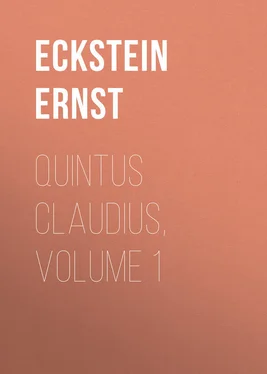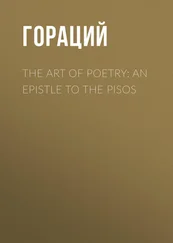Ernst Eckstein - Quintus Claudius, Volume 1
Здесь есть возможность читать онлайн «Ernst Eckstein - Quintus Claudius, Volume 1» — ознакомительный отрывок электронной книги совершенно бесплатно, а после прочтения отрывка купить полную версию. В некоторых случаях можно слушать аудио, скачать через торрент в формате fb2 и присутствует краткое содержание. Жанр: foreign_antique, foreign_prose, на английском языке. Описание произведения, (предисловие) а так же отзывы посетителей доступны на портале библиотеки ЛибКат.
- Название:Quintus Claudius, Volume 1
- Автор:
- Жанр:
- Год:неизвестен
- ISBN:нет данных
- Рейтинг книги:4 / 5. Голосов: 1
-
Избранное:Добавить в избранное
- Отзывы:
-
Ваша оценка:
- 80
- 1
- 2
- 3
- 4
- 5
Quintus Claudius, Volume 1: краткое содержание, описание и аннотация
Предлагаем к чтению аннотацию, описание, краткое содержание или предисловие (зависит от того, что написал сам автор книги «Quintus Claudius, Volume 1»). Если вы не нашли необходимую информацию о книге — напишите в комментариях, мы постараемся отыскать её.
Quintus Claudius, Volume 1 — читать онлайн ознакомительный отрывок
Ниже представлен текст книги, разбитый по страницам. Система сохранения места последней прочитанной страницы, позволяет с удобством читать онлайн бесплатно книгу «Quintus Claudius, Volume 1», без необходимости каждый раз заново искать на чём Вы остановились. Поставьте закладку, и сможете в любой момент перейти на страницу, на которой закончили чтение.
Интервал:
Закладка:
“Aye, and that is your misfortune,” the priest interrupted. “Enough, you know my opinion. However, that which caused me to require your presence here to-day, was not your course of life in general. A particular instance of incredible folly has come to my ears; you are playing a wicked and dangerous game, and I sent for you to warn you.”
“Indeed, father, you excite my curiosity.”
“Your curiosity shall at once be satisfied. Is it true that you have been so rash, so audacious, as to address love-songs to Polyhymnia, the Vestal maiden?" 153 153 Vestal maiden. Priestess of Vesta, the goddess of the hearth. At first they were four, afterwards six. They were chosen between the ages of six and ten, and were obliged to remain in the service of the goddess thirty years, ten as novices, ten as acting priestesses, and ten to instruct novices. Their principal task was to keep the sacred fire alive. They were vowed to chastity, and if they broke their vows were buried alive in the campus sceleratus , while the seducer was publicly flogged to death.
Quintus bit his lip.
“Yes,” he said, “and no. Yes, if you consider the superscription of the verses. No, if you imagine that the poem ever reached her hands.”
The priest paced the room with wide strides.
“Quintus,” he said suddenly: “Do you know what punishment is inflicted on the wretch, who tempts a Vestal virgin to break her vows?”
“I do.”
“You know it!” said the priest with a groan.
“But father,” said Quintus eagerly: “You are branding a jest as a crime. In a merry mood, inspired by wine, I composed a poem in the style of Catullus, and to complete the audacity of it, instead of the name of Lycoris, I placed at the beginning that of our highly-revered Polyhymnia. And now report says – Pah! it is ridiculous! I grant you it was impudent, unbecoming, in the very worst taste if you will, but not calumny itself can say worse of it than that.”
“Well, it certainly sounds less scandalous from that point of view. Quintus, I warn you. Now, if at any time, be on your guard against any deed, any expression, which may be construed as an insult to the religion of the state! Do not trust too much to the influence of my position or of my individuality. The law is mightier than the will of any one man. When what we are now planning takes form and life, severity, inexorable as iron, will decide in all such questions. That reckless jest sprang from a mind, which no longer holds dear the eternal truths of religion. Beware, Quintus, and conceal this indifference; do not come forward as a contemner of the gods. Once more I warn you.”
“Father…”
“Go now, my son, and ponder on what I have said.”
Quintus bowed and kissed the stern man’s hand. Then he left the room with a quick, firm step, and a look of devoted love, of passionate paternal pride followed him as he crossed the room, so tall, lovely and handsome.
CHAPTER VII
Lycoris, the fair Gaul, was giving a splendid entertainment. Valerius Martialis, the greatest wit of the city of the Seven Hills, had recited his newest and most poignant epigrams with loud applause, and the company – more than a hundred persons – were reclining at supper on cushioned divans in the lavishly-decorated eating-room. The young Massilian lady presided. With her neck and shoulders half-veiled in transparent gauze 154 154 Transparent gauze. The island of Cos (Κῶς) belonging to the Sporades, furnished garments made from a half-transparent silk gauze called coa . (See Hor. Sat. I. 2, 101.)
from Cos, her magnificent golden-yellow hair knotted up at the back of her head and wreathed simply with ivy, she smiled radiantly from the head of the table, the object of silent worship to many, and of eager admiration to all. A number of slaves, in handsome Alexandrian dresses, moved quickly and silently about the handsome hall, while across the supper table the conversation each instant grew more lively.
Among the guests was Caius Aurelius, the young Batavian. He had yielded to the pressure of curiosity or of fashion – particularly when the name of the famous epigrammatist had weighed down the scale.
“Really,” he was saying to his neighbor Norbanus – the commandant of the Praetorian guard – “really, Norbanus, till this hour I had esteemed myself rich, but here I feel by comparison a beggar. What splendor, what lavish outlay! Pillars of alabaster, enormous gold plates, 155 155 Gold plates. A room has been discovered on the Aventine, whose walls were concealed by gilded bronze plates encrusted with medals; on the Palatine there was an apartment lined with plates of silver, set with precious stones. The halls and chambers in Nero’s domus aurea were covered with golden plates.
carpets worth an estate – my senses reel. Everything which elsewhere would appear rare and choice is here in every day use. By Hermes! but the father of Lycoris must have been a favorite of fortune.”
“Not so loud!” interrupted Lucius Norbanus. “See, Stephanus is looking this way with a meaning glance.”
“Stephanus! 156 156 Stephanus. I have taken considerable liberties in dealing with this personage in his relation to the Empress Domitia. He is, however, historical.
The Empress’s steward? What has he to do with Lycoris?”
“Ha! well, I will tell you that another time,” said the officer filling his mouth with a fine oyster, 157 157 The oyster, ( ostrea or ostreum ) was considered a great dainty in ancient times. (See note, 42, Vol. 1, “lobster.”)
“between ourselves, you know. Meanwhile, I strongly advise you to taste those delicious mollusks. If you are like me, laughing has made you ferociously hungry.”
“You certainly laughed most heartily,” replied Aurelius accepting some of the praised dish from a slave; "but I, for my part, cannot get up any taste for this kind of verse. Martial is full of wit and humor, but this perpetual mockery, this making a business of holding up all society to ridicule and contempt – no, my dear Norbanus, I cannot like it. More particularly does the way in which he speaks of women displease and vex me. If he is to be believed, there is not in all Rome one faithful wife, or one innocent girl." 158 158 There is not in all Rome one faithful wife, or one innocent girl. See Martial Ep. IV, 71. “Long have I search’d, my Soph, the town, To find a damsel that would frown, But not a damsel will deny, As if a shame ’t were to be shy; As if a sin, will no one dare: I see not one denying fair. ‘Then of the fair is no one chaste?’ A thousand, Soph, you urge in haste. ‘What does the chaste? Enlarge my views.’ She does not grant, nor yet refuse.” Elphinston. In contrast to the hyperbolical expressions of the satirical writers, we are made acquainted in the letters of the younger Pliny, with a number of women of noble character; the historians too, especially Tacitus, as well as inscriptions on the monuments prove – if proof were required – that even in this corrupt age feminine virtue and loftiness of character were not rare. It is natural, that a satirical author should have special keenness of vision for errors and weaknesses.
“Pah!” said Norbanus, with his mouth well filled: “There are some of course, but they are scarce, my dear Aurelius, remarkably scarce.”
“What is amusing you so much, Norbanus?” asked Quintus from his place opposite.
“The old theme – women! Aurelius thinks, that our laurel-wreathed poet has sinned basely against the ladies of Rome, by hinting in his epigrams his doubts of their virtue.”
“Who? What?” cried the poet himself, hastily looking round. “What Ravidus 159 159 What Ravidus?. The poem to which Martial here alludes is found Cat. Carm. XL. “Quaenam te mala mens, miselle Ravide Agit praecipitem in meos iambos?”
is here, to take up the cudgels against my iambics?”
Интервал:
Закладка:
Похожие книги на «Quintus Claudius, Volume 1»
Представляем Вашему вниманию похожие книги на «Quintus Claudius, Volume 1» списком для выбора. Мы отобрали схожую по названию и смыслу литературу в надежде предоставить читателям больше вариантов отыскать новые, интересные, ещё непрочитанные произведения.
Обсуждение, отзывы о книге «Quintus Claudius, Volume 1» и просто собственные мнения читателей. Оставьте ваши комментарии, напишите, что Вы думаете о произведении, его смысле или главных героях. Укажите что конкретно понравилось, а что нет, и почему Вы так считаете.












